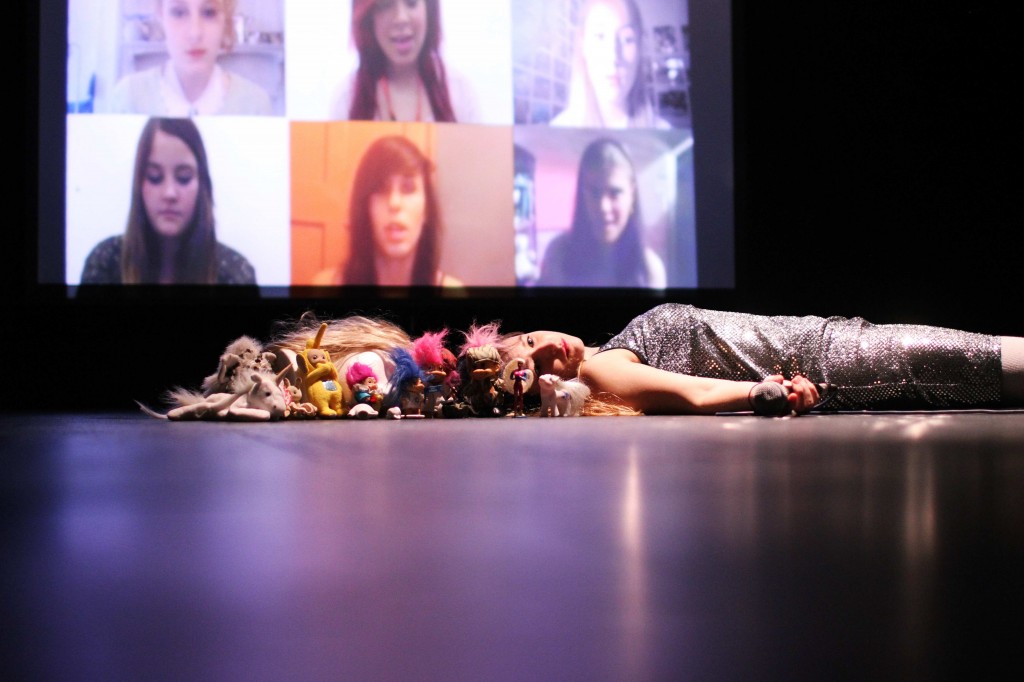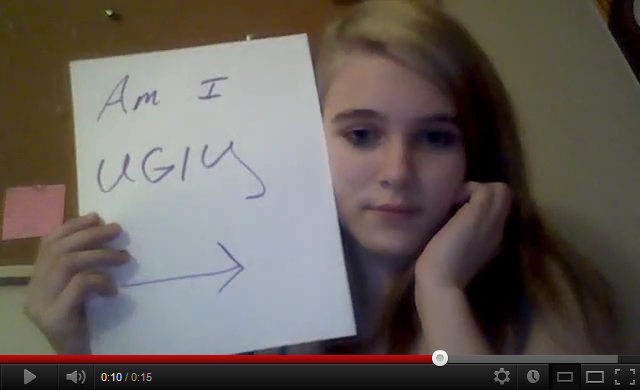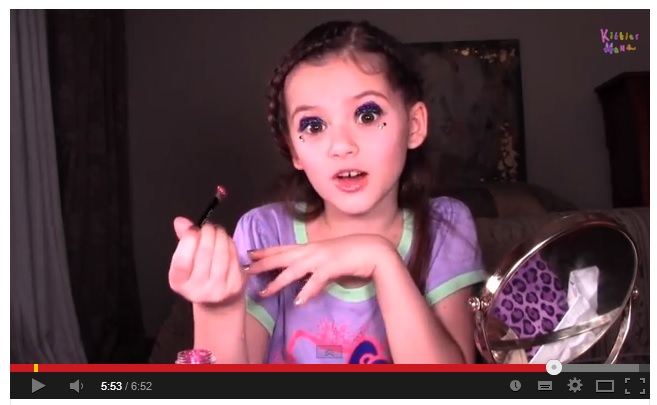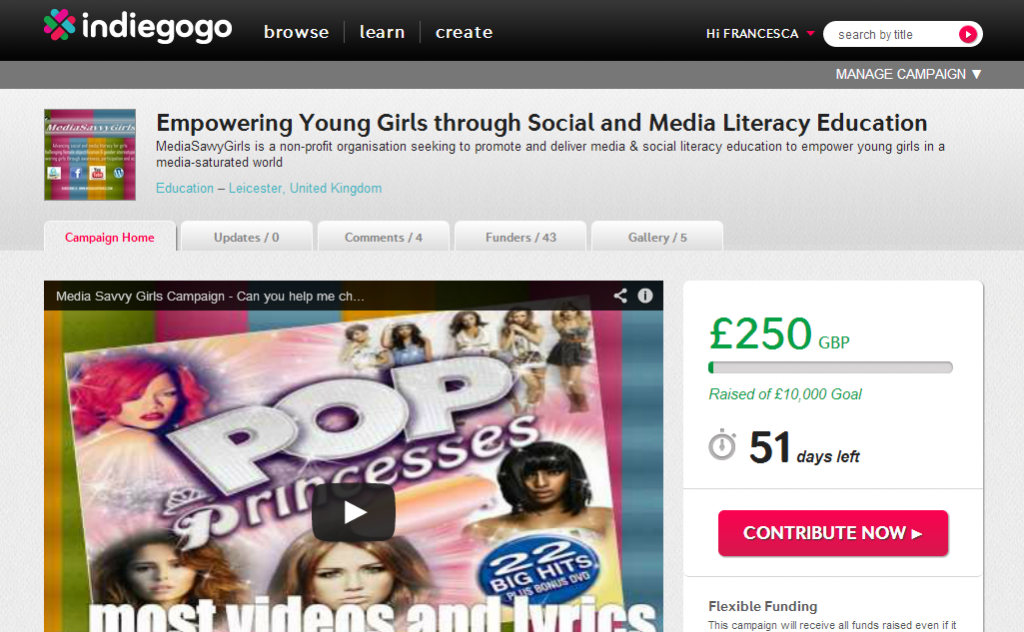 This morning I had a lovely Skype chat with Louise Orwin, the brilliant artist of the PrettyUgly project.
This morning I had a lovely Skype chat with Louise Orwin, the brilliant artist of the PrettyUgly project.
F: Louise, can you tell me a bit more about the research you were doing before starting the PrettyUgly project?
L: My initial research started to explore how teenage girls express their femininity through thinness and masochism; it’s something that really intrigues me. I came across a site called Thinspiration in Tumbrl and this whole community built around thinness. There are literally thousands of pictures of skinny celebrities mixed with pictures of ordinary girls showing pride in their thin bodies and even pictures of just body parts reaching extreme thinness. I remembered myself at 7 years old wanting to go on a diet: I didn’t have such a large community to turn to for tips and suggestions. Now there are thousands of this type of websites and sharing platforms on the subject. I think social media today open up a new world where girls can really grow in their obsession and preoccupation with beauty and their body: you can find posts for example where they help each other with tips on how to best insert your fingers in the throat to puke, I mean it’s insane! How wonder how my life would have been affected if at the tender age of 7 I was able to access this type of material and find this kind of support for my thinness desire. So, yes, this is a thing which really interests me: understanding this whole phenomenon, seeing how teenagers behave online and how their way to use social media is contributing to the obsession, but also I want to raise awareness of the problem through the Pretty Ugly performance.
F: The thing that most shocked me regarding the PoU videos in You Tube is the fact that so many of these girls are incredibly young (under 8).
L: Yes, it was shocking for me as well, and it was hard to believe at first. In the Thinspiration’s type of sites the average age is older, let’s say 16 years old, so you are kind of expecting that type of behaviour from teenagers, but in the PoU videos the average age is way younger, so many 6-7-8 years old and even younger sometimes, it’s crazy…
F: It makes you wonder what they will be thinking when they get older, if they are already so obsessed at this tender age, how they will manage when reaching adolescence?
L: The other thing I noticed is that these girls grow in such celebrity-obsessed environment which make them craving for popularity, so maybe they think any type of attention is better that nothing. Social media for them is there to get some kind of attention. It seems evident that they want their video to be seen by as many viewers as possible, even while risking so many hateful and horrible comments, they don’t seem to care as long as they get some kind of attention.
F: Yes, and I agree with what you said about You Tube’s responsibility in one of your interviews: if the minimum age of You Tube users is something to be taken seriously, then they should not allow videos of such young girls or at least they should protect them in some way by disabling hateful comments from being posted. I wonder how the system works: they are very quick in removing stuff due to copyright infringement but they seem completely indifferent towards other type of complaint. Although, of course, demonising the carrier doesn’t address the cause, we need to take girls and parents’ responsibility into account. This is actually what your project want to tackle, right? Can you tell me about your main learnings from your work with the girls so far?
L: I have still so many questions which are still unanswered but one of the main things I see is that teenagers girls tend to value themselves overwhelmingly on the basis of their appearance: for example in one of the exercises, I ‘ve asked a group of young teenagers to describe themselves in words not relating to their appearance and I could see that they were really struggling to find words/adjectives which were not appearance-related. Another main thing I‘ve realised is that girls have a different way to relate to themselves, depending if it’s in their real life or online. For example the same girls who post these videos in You Tube would probably not ask the same question to people if they were face-to-face. The Internet seems to bring this careless attitude; they look for confirmation without understanding the dangers. I have done a set of street interviews where I would stop teenage girls in the street and ask them to define themselves though words, writing a few word on a piece of paper. In the first half of the paper they would have to describe themselves in their real life, while on the other half they would find words who define them as they appear online, for example in their social network, Facebook and the like. Shockingly, there appears to be a real split between what they thought of themselves in real life and how the portray their identity online. The online profile was all about portraying a popular, out-going, good-looking girl, while their own view of themselves offline would be full of insecurities: it was really a revealing insight.
F: Absolutely. The internet and social media seem somehow to have exacerbated the issue. A completely new area for research is opening up regarding the construction of on-line identities and how these identities can be conflicting or influence off-line identities. Can you tell me a bit more about the workshops you are currently doing with teenagers?
L: I’ve organised them through the local borough-Council, they put me in touch with some local secondary schools and I had the chance to talk directly with groups of teenage girls regarding mainly body image and how the constant bombardment of media portrayals of beauty can make one obsessive about her own appearance. I found that talking about the issue was really liberating for these girls and they had the chance to put things into context, for example understanding how the many images they see around are manipulated through Photoshop and how the whole celebrity culture doesn’t have much to do with real life. For now I only visited some schools as one-off workshop, we get together for 3 to 5 hours and we have this collective time to discuss and reflect on these issues, but the idea would be to keep in touch with these girls and try to arrange some follow-up. It’s difficult though because they have busy lives and even if I’ve tried to get them engaged in a forum, there is very little chance they will actually go on it. Of course, this is expected: there are so many distractions at this age, so many other social platforms where they can share their experience…
F: What about the process of funding your project?
L: It was fairly easy: I‘ve applied to the Art Council as they run this scheme for art projects which was perfect for the idea of my show and I ‘ve managed to raise £10K through them.
F: What are you planning as a future development after this project?
L: Well, for now I want to continue to bring the show in many other places nationally and hopefully even internationally. The show is quite visual so it would be understood even by foreign people. Hopefully we can raise awareness of these issues through this.
F: Thanks Louise, good work! I am sure your show will continue to raise awareness and hopefully be an inspiration for other type of initiatives as well. 😉
More useful articles about the PrettyUgly project:
http://www.wired.co.uk/news/archive/2013-10/11/pretty-ugly
You can visit the PrettyUgly project here:



